- About Us
-
Who we are
-
- Publications
-
- ADPC Academy
-
MediaADPC'S NEWS
Bridging the gender digital divide - International Day of the Girl Child 2021 Bridging the gender digital divide - International Day of the Girl Child 2021
11 Oct 2021
Bangkok, Thailand
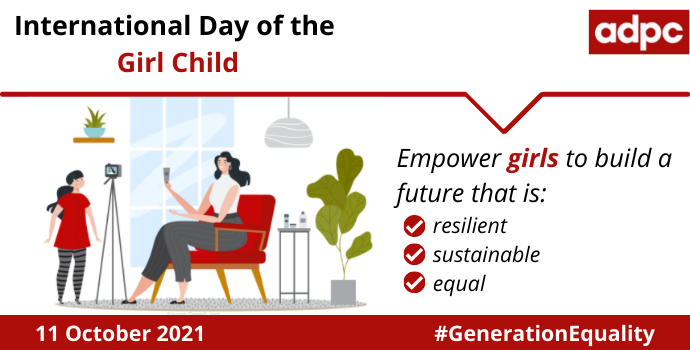
How can science and technology impact gender-equal participation in disaster preparedness and climate resilience?
According to UNICEF, providing access to technology and mentorship opportunities to girls can help transform them into key actors of transformational change in their communities. However, normative and structural barriers may need to be overcome in order to fully achieve this potential.
On the 9th commemoration of International Day of the Girl Child, with the underlying theme of "Digital generation, Our generation", ADPC is raising awareness on promoting girls’ empowerment through digital inclusion and calls for greater action in the Asia and the Pacific region to support gender-equal approaches in disaster risk reduction.
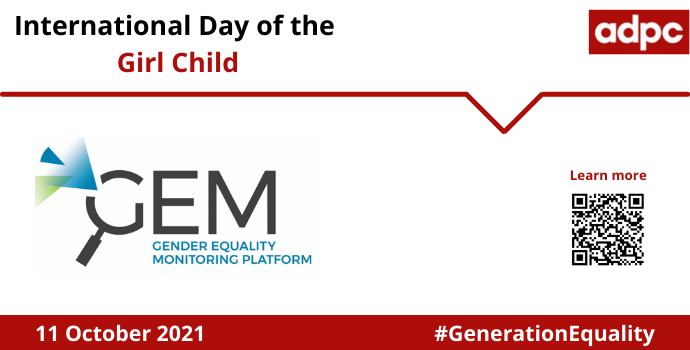
Technology can help minimize risks and help reduce vulnerabilities brought upon by disasters, emergency situations and climate impacts. It provides us with early-warning systems that help identify the origins of disasters, predicts which communities will be at risk, and provides tangible evidence on how natural hazards and human activity can increase the frequency and severity of such risks.
ADPC, through its SERVIR-Mekong project, has launched a variety of publicly available geospatial data-for-development programs that respond to the needs of Lower Mekong countries. The Gender Equality Monitoring (GEM) platform is one such innovation that can help identify gender data gaps at sub-national levels in Cambodia and Viet Nam.
This platform helps track the performance of promoting gender equality and gaps in various sectors such as education, health, employment, household decision-making etc. It also offers an official and periodically updated sex disaggregated data repository for public use. Try it out here.
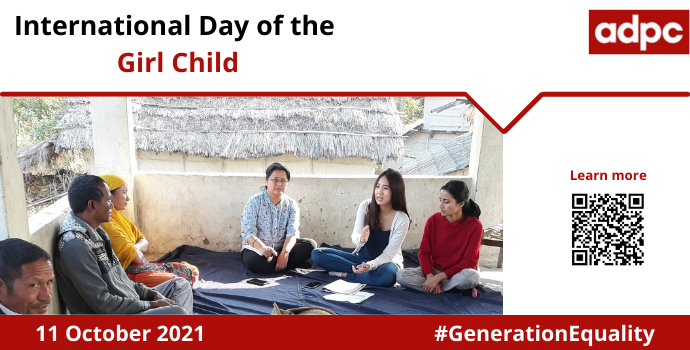
The learning field of Science, Technology, Engineering and Mathematics (STEM) remains a gender-unequal environment. According to UN Women, the digital skills gap can lead to the encoding of gender biases in technology, therefore requiring educational institutions to develop the advanced technical skills and literacies of women and girls to help communities attain the full benefits of the digital revolution.
Investment in compulsory education and digital skills for girls aimed at narrowing the digital gender divide is particularly urgent in developing economies.
Earlier this year, ADPC interviewed some of its female specialists in science and technical positions who are leaders in their own field.
Ms. Chinaporn Meechaiya, Senior Coordinator and Hydrologist at APDC, has a background in urban design planning, specializing in climate change adaptation and flood risk management. She urges fellow women scientists to work hard and give their best in order to blow away gender stereotypes and prejudices. She would like to see more women in science to help promote diversity, fulfill creativity and inspire young girls not to be deterred by the complexity of this industry. See all the stories here.
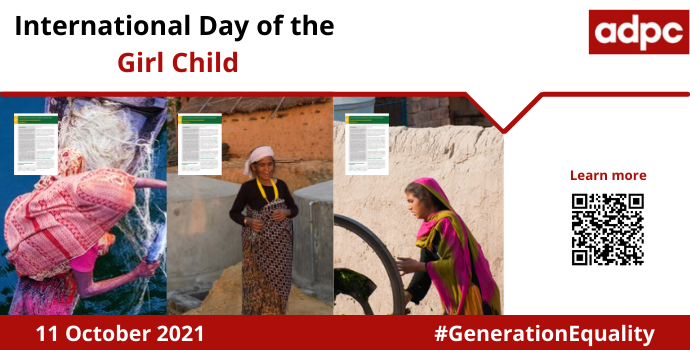
Changing rainfall patterns, riverine floods and cyclones have been challenging gender roles and responsibilities in the South Asia region as climate-induced hazards commonly increase women’s burden and vulnerabilities within and outside households.
ADPC, through its CARE for South Asia project, developed a series of sector briefs on gender mainstreaming in climate change in Bangladesh, Nepal and Pakistan.
A notable finding in these briefs include Bangladesh taking over as leader of the Climate Vulnerable Forum (CVF) in 2020, which presents a unique dual opportunity for the Government of Bangladesh to push global climate actions in favor of climate threatened nations as well as revisit national policies, strategies and plans to categorically benefit vulnerable people, including women.
CVF encourages countries to develop their respective Climate Prosperity Plans (CPP) with the top two priorities focused on investments on young girls and boys and minimization of transport, energy and industry sectors’ dependence on fossil fuel.
The CARE for South Asia project aims to develop gender action plans to facilitate the process of gender mainstreaming in these countries. Integration of gender in national and sub-national sectoral training curriculum is also planned as a part of the capacity development strategy. Learn more about the project here.
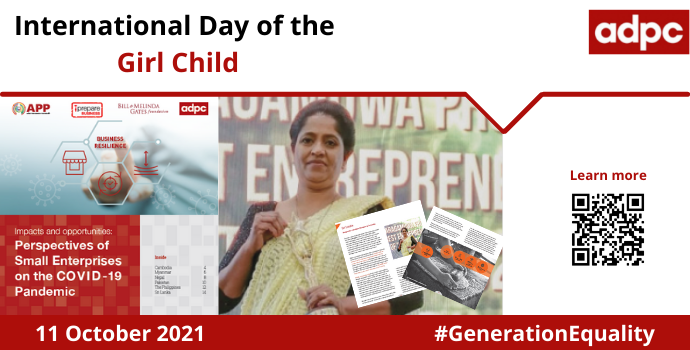
The COVID-19 pandemic, like many emergency situations, has made technology a lifeline for a variety of essential services and to preserve livelihoods. According to a recent statement by the OHCHR, more than 11 million girls might not go back to school due to COVID-19 related educational disruptions.
Furthermore, many women did not get the opportunity to switch to teleworking because of their type of work, lack of connectivity, or care burden at home, which caused them to lose their income. More than 1.7 billion people were financially excluded from the digital economy; women also have the least access to cash transfer programs during the pandemic crisis.
ADPC through its Asian Preparedness Partnership (APP) developed a case study booklet on 'Impacts and opportunities: Perspectives of Small Enterprises on the COVID-19 pandemic' which presents real-life cases from entrepreneurs, individual businesses, and business chambers that are advocating on behalf of micro, small and medium enterprises (MSMEs) in Asia and the Pacific region as well as an expert perspective on business continuity.
A notable case study is that of Ms. Manjula Janaki, an entrepreneur from Sri Lanka, who founded Sakura Products, Pvt. Ltd. Ms. Janaki had struggled to keep compensating her employees like many business owners during the pandemic.
Through her diligent attitude and having access to the right resources, such as the Business Continuing Management Training with Sri Lanka Preparedness Partnership (SLPP) and Ceylon Chamber of Commerce (CCC), gave her training in the science of business resilience and helped her understand the know-how for maintaining her operations during the pandemic.
Ms. Janaki is an excellent example for young women and girls as she exuberates strength and resilience in times of adversity. When given the right opportunity and resources, she can enable transformational change. Read her full story here.
Latest NewsRelated Trainings
-